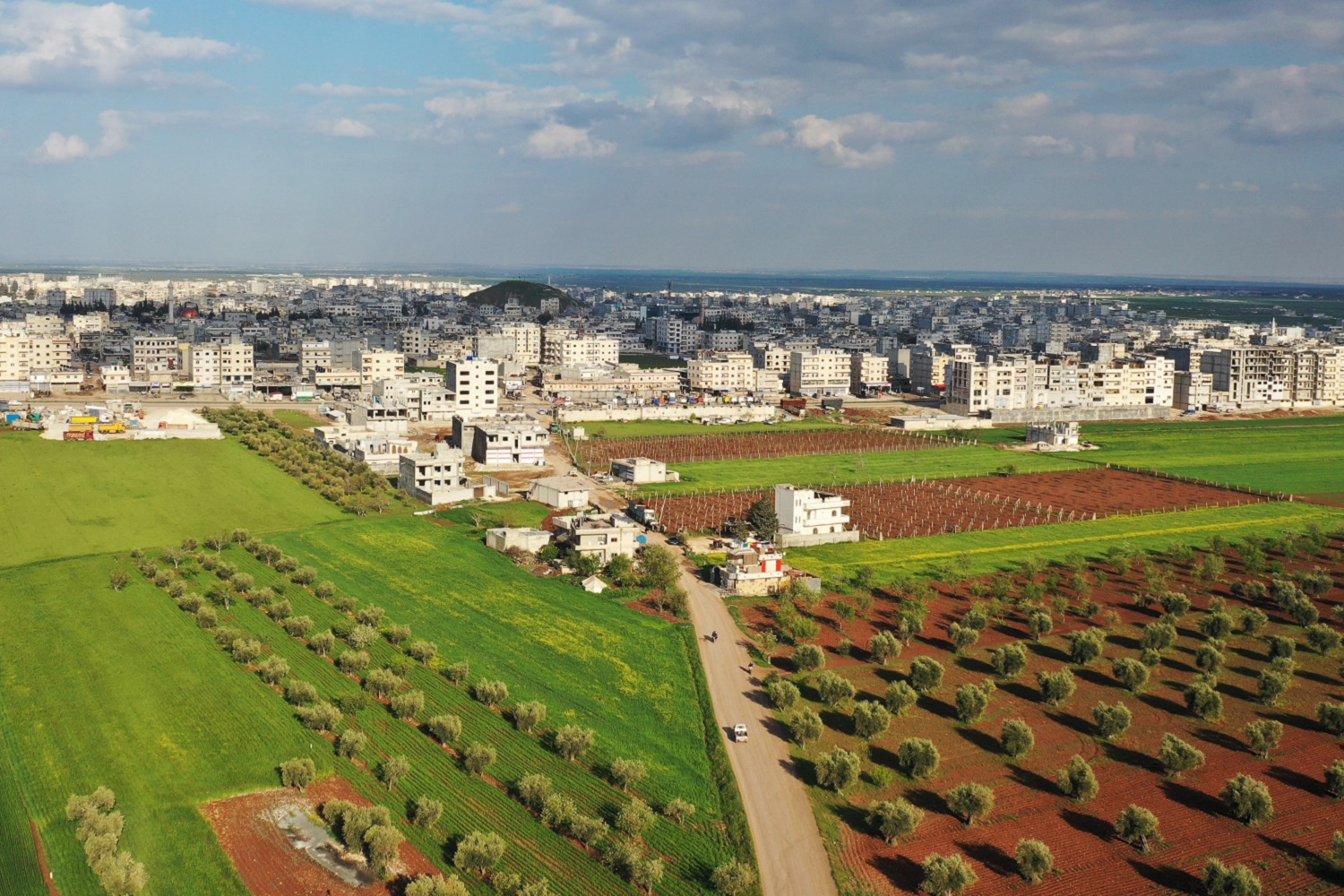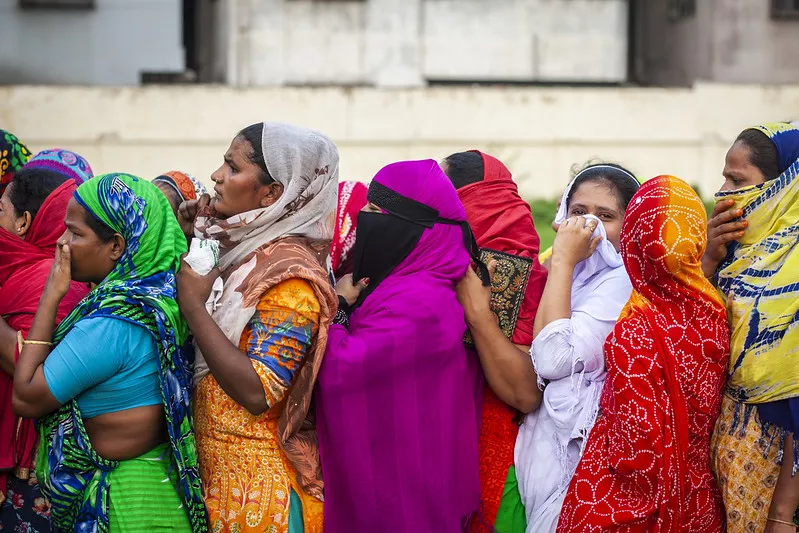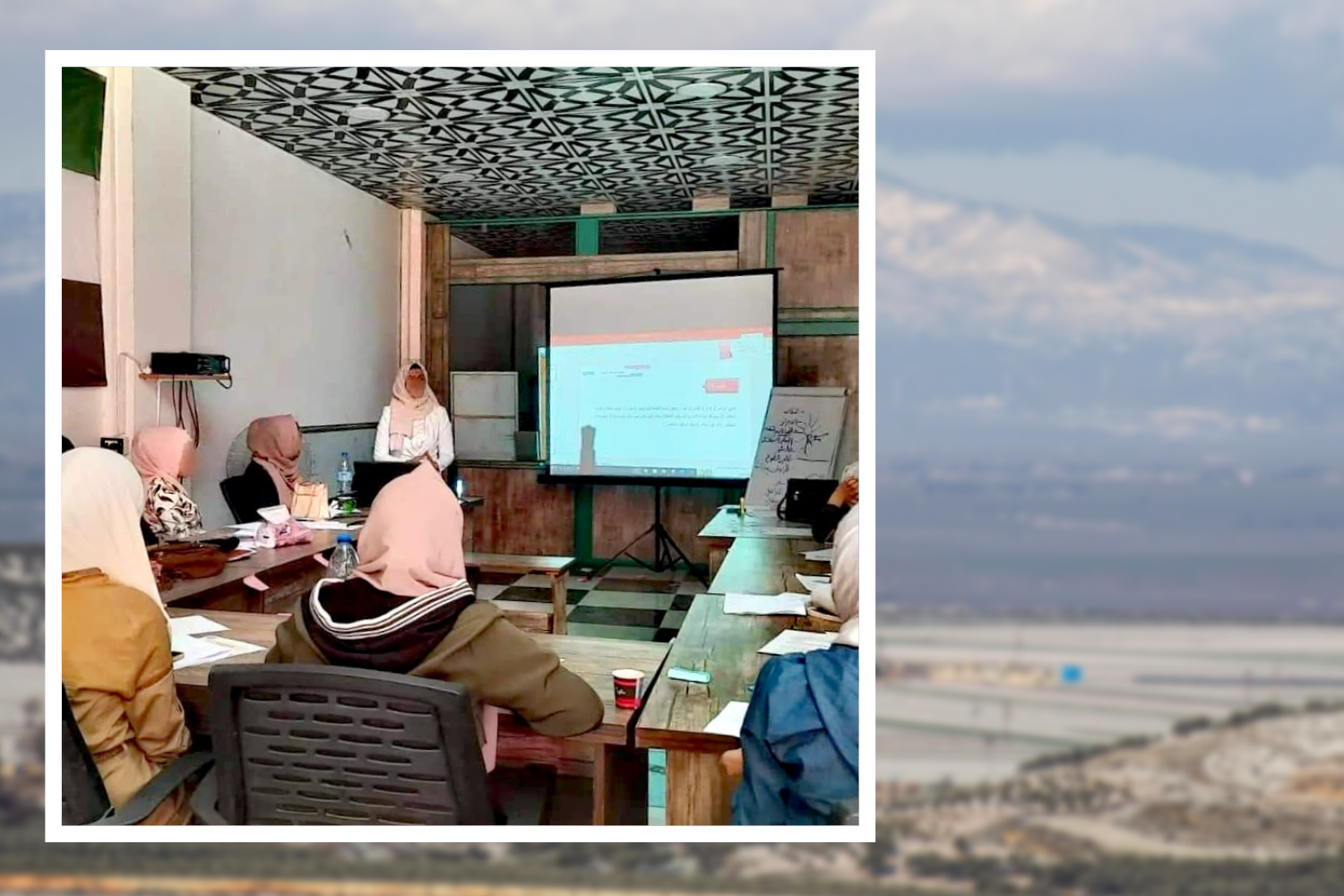Since northwest Syria slipped away from the control of the Syrian regime at the beginning of the conflict, opposition military authorities have assumed a central role in the administrative and decision-making process in the region. This in turn has greatly constrained the role of community leaders, who traditionally represent local families and the city as a civil front.
This blog by Abdalghader Haj Othman draws on interviews conducted with community leaders between November 2022 and March 2023, to look at the impact of such a power shift on social peace in northwest Syria, in particular in the city of Azaz.
For many, Azaz – located in the north of Aleppo – has become the capital of opposition-held northwest Syria. Beyond its symbolic importance, the city has become home to about 200,000 Syrians, many of whom were forcibly displaced from various provinces during the conflict. Over the past decade, Azaz became a miniature model of Syria. The coexistence of different cultures and customs – grounded in the rich diversity of Syrian communities – resulted in the development of a free, inclusive and safe environment favourable to relative social and economic stability in the mid of the turmoil of war. Finally, Azaz is the main artery between the areas controlled by the Syrian regime and the areas governed by a number of opposition armed groups, including the National Army (formerly the Free Syrian Army). In many aspects, Azaz is a strategic location and a potential fertile soil for conflict.
According to the majority of Azaz residents, the city is traditionally characterized by the tolerance of its people and their ability to solve of the most complex problems. This skill came to be known through the famous phrase: “The biggest problem in the city is solved with a moustache kiss”, a reference to the facial hair style of notables and chiefs (mukhtars in Arabic) and their role in the peaceful resolution of disputes, and reconciliation. However, the growing influence of armed groups, compounded by the intensification of regional strife between these groups in early 2017, negatively impacted the ability of community leaders to maintain local peace.
Military leaders replaced community leaders on the social scene in two ways. First, they gained representation and mediation influence, with the support of experienced mukhtars. Second, community leaders lost local authority and influence in decision-making over infrastructure projects and social services, such as building asphalt roads, and the fair distribution of humanitarian aid. This progressive disengagement can be partly explained by the formation process of local councils, administrative civilian bodies, in Azaz. Local council members are not appointed based on prestige, family affiliation, experience or expertise. Instead, the constitution of local councils is a result of closed elite bargain between influential notables, merchants and Turkish officials, under the supervision of the military authority. The decreasing role of community leaders, however, is worrying. In light of the continuous national war, raising poverty and poor education, local and regional conflicts are on the rise, especially among most vulnerable communities such as displaced people in camps.
The mediation mandate of community leaders
Muhammad Musa* was born in the city of Azaz. As a mukhtar, he was appointed by Azaz Local Council to represent one of the city’s neighbourhoods on issues related to public services, identification documents, and home tenancy. He also played a significant role in resolving disputes in and beyond the neighbourhood. For example, in November 2022, he was appointed with other mukhtars by three clans – al-Damalkha, al-Saab, and al-Ghanim – to resolve a dispute that left several people dead and injured. In this case, Muhammad Musa intervened within the mandate of the Civil Peace Office, even though the dispute eventually further escalated and required judicial intervention.
The Civil Peace Office is a unit of the Syrian Council of Clans and Tribes, based in the village of Salama, on the Syrian-Turkish border. The office offers mediation to family and clan disputes before they reach the judiciary. According to the Office secretary, Abdullah Haj Saeed, the role of the notables is not limited to mediation but also involves collecting funds to pay blood money or diya, which is the compensation paid to the family of the victim, or any compensation for damages when a party is financially not able to pay it. Community leaders also promote social peace through reconciliation. Mazen Hasano, the head of the Reconciliation Office in the Syrian Tribes and Clans Council, explains that the Office is the preferred mechanism for conflict resolution. Over time, this traditional mechanism, coupled with the influence of local notables, gained the trust of communities who accept the involvement of the Office in their disputes without preconditions.
However, the mediation mandate of community leaders finds its limits in factional fighting that involve clashes between armed groups. In northwest Syria, such disputes are often linked to family disputes. In January 2023 for instance, the city of Azaz witnessed a small dispute between military men, which later turned into a family quarrel between the Ashawi family and other families from the nearby village of Menagh. Within hours, it expanded into a regional fight between the people of Azaz and the people of Menagh. This escalation can be explained by two main factors: the strong ties between some armed factions and members of important families and/or clans, and the influence of large military groups. As a result, notables are sometimes drawn into conflicts that involve their family or clan. This phenomenon is best illustrated by the al-Mawali clan whose members live across northwest Syria. In August 2022, some of the clan’s members who engaged in drug trade were confronted by the military police in the mountainous area of Maydanka. As a result of the clashes, they called on their clan, including its influential men, to respond militarily, thereby drawing the region of Azaz, Maydanka and Afrin into scattered disputes.
An incomplete mandate
Despite their important role in dispute resolution, community leaders in Azaz often regret that the other social tasks they used to carry out were delegated by the local council to other actors. Indeed, the local council has been unwilling to give broad powers to local leaders in the field of service distribution. Rather than an act of defiance, this policy is due to the council’s inability to follow financial and service transparency policies, which are under the supervision of Turkish institutions. This is especially visible in the relief sector, which has become the key source of survival for Syrians amid the conflict.
Al-Mukhtar Abu Firas, from the city of Azaz, told the author that he failed five consecutive times to obtain relief baskets from the Relief Office of the city council. He wanted to distribute these baskets to poor, displaced families who do not have a breadwinner. Abu Firas also failed to obtain a personal identity card for people in his neighbourhood. These repetitive failures reduced his social role, including his authority and legitimacy. He assumed that the informal character of his request justified the council’s rejection and argued that, as a resident, he should be given a special role to assess the needs of residents in his neighbourhood.
Al-Mukhtar Mahmoud, a mukhtar in Azaz, comes from one of the oldest families in the city. He believes that the relief sector plays a major role in both strengthening social cohesion and fuelling local conflicts. Unfortunately, he argues, aid has been a factor of tension in northwest Syria. It leads to disputes between the displaced and host communities, and exacerbates family disputes because members do not have equal opportunities to receive aid. Since this distribution of aid is supervised by the local council and humanitarian organizations only, community leaders cannot prevent the emergence of such tensions and address the problem at its source; they only intervene to mediate existing conflicts.
Beyond the relief sector, the pervasiveness of Turkish authorities in all areas of political and administrative life in northwest Syria greatly limits the role of community leaders. Notably, members of local councils, mayors, and heads of key institutions are appointed jointly by local factions in the national army in coordination with the province of Kilis – based on their interests and vision for the region. As a result, local councils in northwest Syria are affiliated with the Turkish states and Turkish officials are directly responsible for the general policies of the councils. Such practices are exclusive not just of local community leaders but Syrian people in general. While opposition governments in Aleppo province – the Syrian Coalition Authority and the Syrian Interim Government – are technically in charge of administering the region, they have hardly any connection or influence on the ground. For example, in 2019, the local councils took the decision to ban the circulation of the Syrian currency in northwest Syria and to replace it with the Turkish lira. The decision was issued without referring to the Ministry of Finance in the Interim Government.
Promoting divisions
Despite their clear social authority, the role played by community leaders is characterized by spontaneity and disorganization; this is a double-edge sword. On the positive side, they are able to engage in spontaneous, unbiased social mediation and internal arbitration between families and clans. Community leaders will hold reconciliation meetings in one of the guesthouses of the city’s main families, such as the Bani Khaled guesthouse and the Bani Khamis guesthouse, which are used to solve disputes between the host and displaced communities in Azaz. These houses are also used to receive delegations from outside the city. In 2021, the Bani Khaled guesthouse hosted an American-Syrian investment delegation with the coordination of the local council’s Unit Organization. During the meeting, merchants and dignitaries discussed the city’s need for industrial investment by Syrians residing in the European Union and the United States.
On the negative side, community leaders seem unable to integrate modern forms of government under the auspices of Turkey, and therefore, to engage in civil administration and answer residents’ needs. Since 2018, Azaz witnessed numerous demonstrations against service institutions. Notably, demonstrators accused the local council and the energy and electricity company AK ENERGY of corruption and bias. They set up a sit-in tent that remained for 40 days and ended with the dismissal of the head of the local council, Muhammad Haj Ali, by the military administration in Azaz. In addition to prompting political change, the demonstrations provided an opportunity to open the discussion about the role of the mukhtars. Indeed, community leaders were unable to solve the dispute, due to their lack of influence and engagement in these sectors. As a result, Rashid Zamout – a notable from the Zamout family and the commander of the Northern Army faction – called for a meeting in August 2018. The meeting aimed to provide a platform to discuss the social role of community leaders and the need for self-determination of administrative bodies in Azaz. Unfortunately, the event highlighted the divisions within important local families along dissenting loyalty lines and no decision was reached.
The failure of the meeting marked a shift in social representation in Azaz. Families and clans formed groups on social media in an attempt to represent themselves and claim their rights. This organic process gave birth to the Honourable People of Azaz, a gathering of more than a hundred local leaders and personalities in the city. Ever since, the group took on the mission to represent the city’s residents, thereby providing an alternative representation to that of the local council. For instance, they issue statement on events considered important for the city’s people, such as Hayat Tahrir al-Sham’s recent attack on the Third Corps in the countryside of Azaz in the early days of 2023. The gathering also held a conference bringing together local notable figures and military leadership to discuss the city’s administration and services. A detailed monitoring of online reactions following the conference demonstrated that the great majority of city’s residents were not aware of the existence of the gathering and failed to understand of the role they play. A survey** of 50 young men in Azaz yielded similar results, with 42 of them showing no knowledge of the gathering and its mission.
Moreover, some notable figures later withdrew from the group. When I interviewed them to understand their disengagement, they mentioned the lack of understanding of the role they should play within the Honourable People of Azaz, their limited ability to change the city, and their fear of a clash with the military authorities. All these elements led to their further marginalization as social representatives and threatened their economic interests in the city. It also demonstrates, yet again, the extent of the military authorities’ penetration into the family and clan structures in northwest Syria.
Enhancing the social role of community leaders
Some argue that the financial stability of community leaders is key to helping them play a role in providing services to the city’s residents. Enabling strong community leaders would also relieve popular pressure on public institutions and contribute to social cohesion by strengthening people’s trust and confidence in their institutions. These voices suggest that Azaz Local Council should accept the mandate of mukhtars and other notables, especially for needs assessment and services distribution, and offer financial compensation in exchange to their service. Yet, these calls have remained unanswered as the local council sees these services as voluntary efforts. Administrative officials also argue that working without financial compensation is traditionally a prerequisite to announce one’s intention to sit as a notable in the local council.
Community leaders, on their side, continue to campaign to play a greater role in the monitoring of performance of the local council. Beyond ensuring fair services and opportunities for all families, they have set their sight on transparent politics. This includes the selection of local council members to ensure that professional qualifications prevail over links with influent actors such as Turkish and military authorities.
Despite their efforts, the city announced the restoration of the local council in October 2022 and justified the exclusion of community leaders from decision-making with the fear that stronger official representation will fuel popular demands and contribute to the escalation of disputes within the city. Social peace remains a challenge, even in Azaz, one of the last remaining islands of stability and freedom in a war-torn country.


